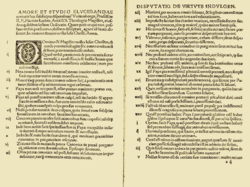| Part of a series on the |
| Reformation |
|---|
 |
| Protestantism |
Gottschalk of Orbais (Latin: Godescalc, Gotteschalchus) (c. 808 – 30 October 868) was a Saxon theologian, monk and poet. Gottschalk was an early advocate for the doctrine of double predestination, an issue that ripped through both Italy and Francia from 848 into the 850s and 860s. Led by his own interpretation of Augustine's teachings on the matter, he claimed the sinfulness of human nature and the need to turn to God with a humility for salvation. He saw himself as a divine vessel calling all of Christianity to repent for decades of Civil War. His attempts of this new Christianisation of Francia ultimately failed, his doctrine was condemned as heresy at the 848 council of Mainz and 849 council of Quierzy. Following his conviction as a heretic Gottschalk remained stubborn to his ideology disobeying the ecclesiastical hierarchy, making him an "actual heretic in the flesh", for this disobedience Gottschalk was placed in monastic confinement; however the shockwaves his ideology sent around Western Christendom refused to stop reverberating, Gottschalk managed to win over more followers and the threat remained up until his death in 868.[1]
- ^ Matthew Gillis, ‘Heresy in the flesh: Gottschalk of Orbais and the predestination controversy in the archdiocese of Rheims’, in Stone and West (eds.), Hincmar of Rheims, Life and Work, pp. 247- 267